新概念2-第34课
新概念第二册课文翻译及学习笔记【Lesson34、35、36】

新概念第二册课文翻译及学习笔记【Lesson34、35、36】【课文】First listen and then answer the question.听录音,然后回答以下问题。
How long had the police taken to find his bicycle?Dan Robinson has been worried all week. Last Tuesday he received a letter from the local police. In the letter he was asked to call at the station. Dan wondered why he was wantedby the police, but he went to the station yesterday and nowhe is not worried anymore. At the station, he was told by a smiling policeman that his bicycle had been found. Five days ago, the policeman told him, the bicycle was picked up in a small village four hundred miles away. It is now being sentto his home by train. Dan was most surprised when he heardthe news. He was amused too, because he never expected the bicycle to be found. It was stolen twenty years ago when Dan was a boy of fifteen!【课文翻译】丹.鲁宾逊焦虑了整整一个星期。
(完整版)新概念英语第二册课件(Lesson-34-Quick-work)

★ most [ məust ] ad. 最;相当,非常 e.g. the most important discoveries a most interesting movie
worry ['wʌri] ['wɜ:ri] adj.表示“焦虑的”、“担心的” e.g.: She’s worry. vt. 表示“使担心/发愁” e.g.: Nothing worries me vi.表示“忧虑,担心” e.g.: She appears to be worried about
wonder= want to know wonder whether/if/who/when/where/what/why
+ 从句”
她想知道那个孩子在干吗。 She wondered what the child was doing. 我想知道他来不来。 I wonder whether/if he will come.
一只睡着的狗 a sleeping dog
一张焦虑的脸 a worried face
• Five days ago, the policeman told him, the bicycle was picked up in a small village four hundred miles away.
accept &receive? 他已经接受了我们的邀请。
He has accepted our invitation. 我没有收到你的传真。
I didn’t receive your fax. accept: 强调主动地或自愿地接受,或者说,经过考虑后同意
接受。
receive: 着重仅仅接到或收到这一结论或事实,而不含采取主 动或积极行动的意思。
新概念二第34课课文原文
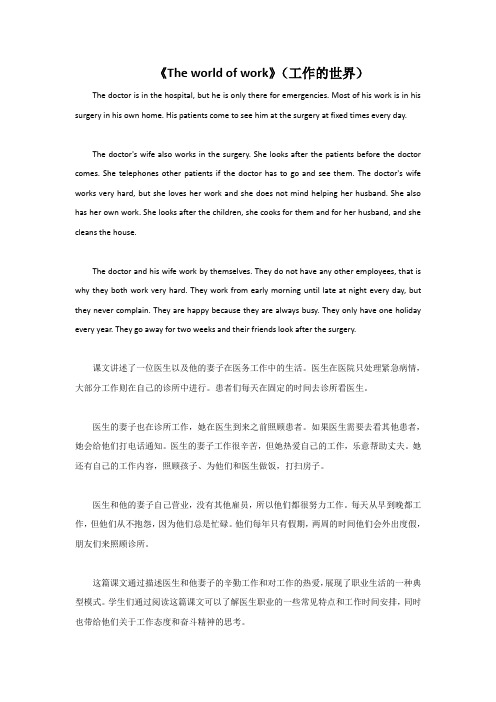
《The world of work》(工作的世界)The doctor is in the hospital, but he is only there for emergencies. Most of his work is in his surgery in his own home. His patients come to see him at the surgery at fixed times every day.The doctor's wife also works in the surgery. She looks after the patients before the doctor comes. She telephones other patients if the doctor has to go and see them. The doctor's wife works very hard, but she loves her work and she does not mind helping her husband. She also has her own work. She looks after the children, she cooks for them and for her husband, and she cleans the house.The doctor and his wife work by themselves. They do not have any other employees, that is why they both work very hard. They work from early morning until late at night every day, but they never complain. They are happy because they are always busy. They only have one holiday every year. They go away for two weeks and their friends look after the surgery.课文讲述了一位医生以及他的妻子在医务工作中的生活。
新概念第二册 Lesson 34课件
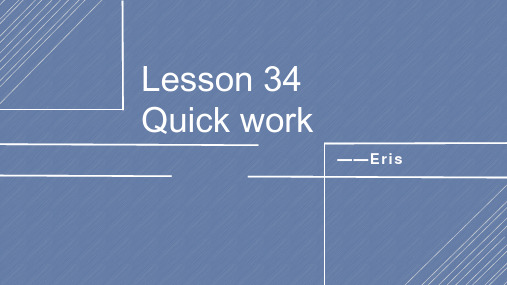
课文分析
【2】Last Tuesday he received a letter from the local police.
★local adj. 当地的,本地的
local news 当地新闻 local color 地方特色 local people 当地人
native ['neɪtɪv] n. 土著人 adj. 土生土长的
【练一练】 这是这个家庭最有趣的照片。 This is the most interesting photo of the family.
单词讲解
many和much的最高级 many--more--most much--more--most most绝大多数的(前面不加冠词)
例:大多数的男孩喜欢足球。 Most of the boys like football. 【练一练】:他们中的大多数都迟到了。 Most of them were late.
She wondered who that man was/ what had happened. 她想知道那个人是谁/到底发生了什么事。
She wondered what the child was doing. 她想知道那个孩子在干吗。
I wonder whether/if he will come. 我想知道他来不来。
For some reason, they called off the party.
【练一练】开始下雨了所以我们取消了比赛。
It began to rain so we called off the match.
【练一练】
1. I called _o_n__ you five times yesterday. Were you out?
新概念英语第二册第34课习题答案详解

新概念英语第二册第34课习题答案详解1. d根据课文第3行Dan wondered why he was wanted by the police… 能够判断d. he didn’t know why the police wanted him 是感到焦虑的真正原因,所以应该选d. 其他3个选择都是课文提及的情况,但不是他焦虑的真正原因。
2. a根据课文第8-9行Dan was most surprised… he never expected the bicycle to be found 能够判断,只有a. had probably forgotten all about his bicycle(可能把他的自行车早忘得一干二净了)符合当时的心情,是准确答案。
其他3个选择都不符合他当时的心理感受。
3. b(c)yet (d)anymore 都不符语法,因为它们常用于否定句中,而本句是肯定句. (a)even 不符合题意,应该同比较级连用才准确;(b)still 能够用在肯定句中表示仍然,还,所以只能选(b)still4. ca. had been finding 和 d. have been finding 都不是准确的时态,动词find(找到)强调结果,不应该用实行时态;b. had been found语态不对,因为本句的主语是人,是动作的执行者,故不能用被动语态;c. had found最合乎时态和语态,所以只能选c5. a本句是对地点提问的疑问句,回答是In a small village,只有a. Where 是问地点的,所以a. 是准确答案,而其他3个选择都不是问地点的。
6. da. to 和b. to be 都不合乎语法,因为以that引导的是从句,应该有主语和谓语,而不应该是用to引导的动词不定式, c. they也不合乎语法,因为主句动词是过去式,从句也应该是过去时态. d. they would 是过去将来时,最合乎语法,所以只能选它.7. c本句有表示过去时间的状语twenty years ago(20年前),所以应该用一般过去时。
新概念2第34课
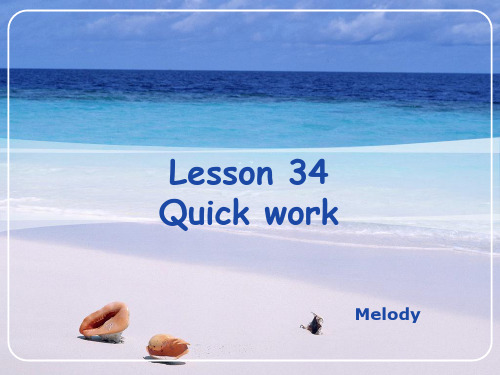
1)n.(政府机关等)局、所、中心:供应站; (广播)电台 a police station 警察局a fire station 消防局 a power station 供电局 TV station 电视台
2)n.车站 A rail way station 火车站 站 A bus station 汽车
作将于三小时后完成。 The baby must be looked after well. 这孩子必须被好好照顾。
Text Explanation
Dan Robinson has been worried all week. 1.现在完成时表示过去一直延续到现在,并有可能继 续延续下去的动作。 2.be worried about sth 对…感到担心 3.all all all all week 整整一个星期 day long 整整一天 year round 整年 day and all night 整日整夜
Text Explanation
It was stolen twenty years ago when Dan was a boy of fifteen!
1.rob 与 steal 的用法区别 1) 从意思上看: rob 指公开地“抢”、“夺”(通常使用暴力); 而 steal 则指在人们不防备或不在场的情况下悄悄地“偷”。 2)从结构上看,两句所使用的句型完全不同 rob+被抢的人或地方+of+被抢的东西 steal+被偷走的东西+from+某人或某地
Text Explanation
It is now being sent to his home by train.
by by by by by train 坐火车 bus 坐公共汽车 road 通过陆路 sea 通过水路 air 通过飞机
新概念英语第二册第34课课文

新概念英语第二册第34课课文
摘要:
一、课文概述
1.文章主题:描述一个关于一位年轻女子Joanna的日常生活和兴趣爱好
2.文章结构:分为三个段落,分别介绍Joanna的早晨、下午和晚上活动
二、详细内容
1.早晨部分
a.Joanna起床时间及早晨习惯
b.早餐内容
c.前往工作地点的交通方式
2.下午部分
a.工作内容
b.下午茶的享用
c.下班后的购物活动
3.晚上部分
a.与朋友共进晚餐
b.晚间娱乐活动:看电影、跳舞
c.回家后的阅读习惯
正文:
新概念英语第二册第34课课文以一位名叫Joanna的年轻女子为主人公,生动地描绘了她的日常生活和兴趣爱好。
在早晨,Joanna会在7:30起床,然后进行简单的晨练,如做一些伸展运动。
接着,她会为自己准备一顿丰盛的早餐,包括牛奶、麦片、水果和面包。
之后,她乘坐公共汽车前往工作地点。
在下午,Joanna会开始她忙碌的工作,这包括处理文件、接听电话以及与同事讨论项目。
下午茶时间,她会品尝美味的蛋糕和红茶,以此放松自己。
下班后,Joanna喜欢去商场购物,为自己添置一些衣物和日用品。
晚上,Joanna有时会与朋友共进晚餐,谈论彼此的近况。
之后,她们可能会去看一场电影,或者去舞厅跳舞。
尽情娱乐之后,Joanna会在晚上10:30左右回到家中,在睡前进行一段阅读,以此结束她充实的一天。
这篇课文通过描述Joanna的日常生活,向我们展示了她健康、充实的生活方式。
新概念英语第二册第34课课文
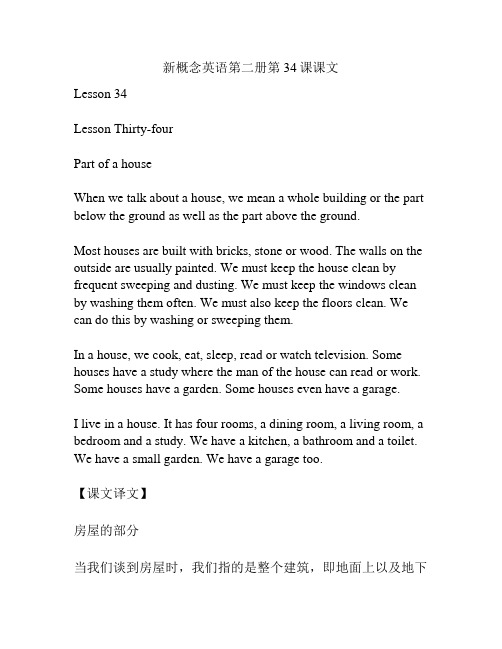
新概念英语第二册第34课课文Lesson 34Lesson Thirty-fourPart of a houseWhen we talk about a house, we mean a whole building or the part below the ground as well as the part above the ground.Most houses are built with bricks, stone or wood. The walls on the outside are usually painted. We must keep the house clean by frequent sweeping and dusting. We must keep the windows clean by washing them often. We must also keep the floors clean. We can do this by washing or sweeping them.In a house, we cook, eat, sleep, read or watch television. Some houses have a study where the man of the house can read or work. Some houses have a garden. Some houses even have a garage.I live in a house. It has four rooms, a dining room, a living room, a bedroom and a study. We have a kitchen, a bathroom and a toilet. We have a small garden. We have a garage too.【课文译文】房屋的部分当我们谈到房屋时,我们指的是整个建筑,即地面上以及地下的部分。
新概念英语第二册第34课课文

新概念英语第二册第34课课文(原创版)目录1.新概念英语第二册第 34 课课文概述2.文章的主要内容和结构3.文章中的重点词汇和短语4.文章的语法特点和难点5.文章的学习建议和应用场景正文一、新概念英语第二册第 34 课课文概述新概念英语是一套世界著名的英语教材,被广泛应用于英语学习者中。
第二册的第 34 课课文,是一篇介绍如何学习英语的文章,旨在帮助学习者更好地掌握英语学习方法。
二、文章的主要内容和结构文章主要分为三个部分。
第一部分讲述了英语学习的重要性,以及如何提高英语学习效率。
第二部分介绍了几种有效的英语学习方法,如坚持每天学习,参加英语角,看英文电影等。
第三部分则从心理层面分析了学习英语可能遇到的困难,并给出了应对策略。
三、文章中的重点词汇和短语1.Importance of learning English:学习英语的重要性2.Improve efficiency:提高效率3.Effective methods:有效的方法4.Difficulties:困难5.Strategies:策略四、文章的语法特点和难点本文的语法特点主要是使用了较多的比较级和最高级,如"more effective", "the most efficient"等。
这些比较级和最高级可以帮助学习者更准确地表达观点。
然而,对于初学者来说,理解这些语法结构可能会有一定的难度。
五、文章的学习建议和应用场景学习这篇文章时,建议学习者首先理解文章的大意,然后再深入学习其中的语法结构和词汇。
在实际应用中,学习者可以将文章中的学习方法应用到自身的英语学习中,以提高学习效率。
新概念英语第二册第34课-quick work

新概念英语第二册第34课:quick workLesson 34 quick work破案“神速”First listen and then answer the question.听录音,然后回答以下问题。
How long had the police taken to find his bicycle?Dan Robinson has been worried all week.丹.鲁宾逊焦虑了整整一个星期。
Last Tuesday he received a letter from the local police. In the letter he was asked to call at the station.上星期二他收到当地警察局的一封信,要他到警察局去一趟。
Dan wondered why he was wanted by the police, but he went to the station yesterday and now he is not worried anymore.丹奇怪警察为什么找他,但昨天还是去了,结果他不再担心了。
At the station, he was told by a smiling policeman that his bicycle had been found.在警察局里,一位面带笑容的警察告诉他,他的自行车找到了。
Five days ago, the policeman told him, the bicycle was picked up in a small village four hundred miles away.那位警察对他说,那辆自行车是5天前在400英里外的一个小村里发现的It is now being sent to his home by train. Dan was most surprised when he heard the news. He was amused too,现在正用火车给他运回家来。
新概念英语第二册第34课Quick work 破案神速

Quick Work
Nice to meet you!
Tell me about yourself.
•Did you do anything special on your winter vacation?
•Have you ever been to a police station? • Have you been on the scene of a crime?
• Considered the first professional medical examiner (法医) in the world.
• Comprehended the unique skill of dissecting (解剖) dead bodies that helped him solve some most difficult cases.
Dan Robinson has been worried all week. Last Tuesday he received a letter from the local police, in which he was asked to call at the station. He was wanted by the police, which made him puzzled. He went to the station yesterday and now he is not worried anymore. At the station he met a smiling policeman who told him, “Your bicycle has been found.” Five days ago, the policeman told him, the bicycle was picked up in a small village (which was) four hundred miles away. It is now being sent to his home by train. Dan was most surprised when he heard the news about the bicycle, which was lost in the year when he was a boy of fifteen. But was it found in the same place as he lost it?!
新概念2第34课重点字词
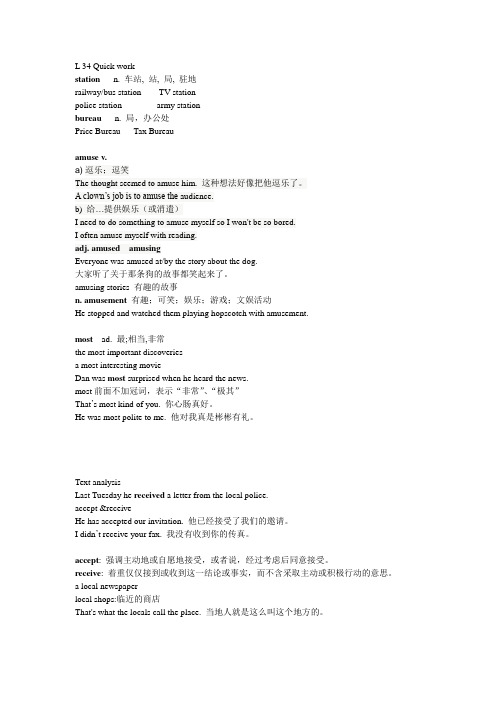
L 34 Quick workstation n. 车站, 站, 局, 驻地railway/bus station TV stationpolice station army stationbureau n. 局,办公处Price Bureau Tax Bureauamuse v.a) 逗乐;逗笑The thought seemed to amuse him. 这种想法好像把他逗乐了。
A clown’s job is to amuse the audience.b) 给…提供娱乐(或消遣)I need to do something to amuse myself so I won't be so bored.I often amuse myself with reading.adj. amused amusingEveryone was amused at/by the story about the dog.大家听了关于那条狗的故事都笑起来了。
amusing stories 有趣的故事n. amusement有趣;可笑;娱乐;游戏;文娱活动He stopped and watched them playing hopscotch with amusement.most ad. 最;相当,非常the most important discoveriesa most interesting movieDan was most surprised when he heard the news.most前面不加冠词,表示“非常”、“极其”That’s most kind of you. 你心肠真好。
He was most polite to me. 他对我真是彬彬有礼。
Text analysisLast Tuesday he received a letter from the local police.accept &receiveHe has accepted our invitation. 他已经接受了我们的邀请。
新概念英语第二册34课听力及课文讲解

新概念英语第二册34课听力及课文讲解第一部分WORDS AND EXPRESSIONSDanRobinson丹.鲁宾逊worriedadj.焦虑的call at 拜访amusedadj.愉快的,开心的inefficient 低效率的behind the bar 关在监狱里be greatly relieved 如释重负a false alarm 虚惊一场第二部分TEXTDan Robinson has been worried all week. Last Tuesday he received a letter from the local police. In the letter he was asked to call at the station.Dan wondered why he was wanted by the police,but he went to the station yesterday and now he is not worried anymore. At the station,he was told by a smiling policeman that his bicycle had been found. Five days ago,the policeman told him,the bicycle was picked up in a small village four hundred miles away. It is now being sent to his home bytrain. Ted was most surprised when he heard the news. He was amused too,because he never expected the bicycle to be found. It was stolen twenty years ago whenDan was a boy of fifteen !参考译文丹?鲁宾逊焦虑了整整一个星期. 上星期二他收到当地警察局的一封信,要他到警察局去一趟. 丹奇怪警察为什么找他,但还是去了,结果他不再担心了. 在警察局里,一位面带笑容的警察告诉他,他的自行车找到了. 那位警察对他说,那辆自行车是5天前在400英里外的一个小村里发现的,现在正用火车给他运回家来. 丹听到这个消息后,惊奇万分,但又感到非常好笑,因为他从未指望那辆自行车还能找到. 这是20年前丹还是一个15岁的孩子时被人偷走的!第三部分LANGUAGE POINTS1、Dan Robinson has been worried all week.has been worried:be worried(adj.)的完成时态,而不是被动语态,类似词还有surprised,amused,excitedamazed,confused,shocked这些词都和感觉有关,常与系动词(be,get,feel,become,etc.)构成系表结构all week:此处也可以用for the whole week2、In the letter he was asked to call at the station.be asked to do sth:主动语态为ask sb. to do sth.call at:pay a visit to 拜访3、Dan wondered why he was wanted by the police.Dan wondered why he was wanted by the policewonder后跟why引导的宾语从句,从句中主谓语序不能颠倒be wanted:只是指警察要找他4、Now he is not worried anymore.=Now he is no longer worried.not......anymore = no more 不再,再也不5、The bicycle was picked up in a small village four hundred miles away.away:adv.表示多少距离之外pick up:意外地找到第四部分KEY STRUCTURES AND USAGE被动语态Ex:1)In the letter he was asked to call at the station.2)Dan wondered why he was wanted by the police.3)At the station,he was told(被动语态的过去式)by a smiling policeman that his bicycle had been found(被动语态的过去完成时).4)The bicycle was picked up in a small village four hundred miles away.5)It is now being sent to his home by train.课文中有用句型He never expected the bicycle to be found.He never expected that the bicycle would be found.He never expected that the police would find the bicycle. Exercises一、中译英1、这2个人正受到警方通缉。
新概念英语第二册lesson34课文

《新概念英语第二册》是英国剑桥大学出版的一套学习英语的教材,被广泛应用于全球各地的英语学习者中。
lesson34课文是其中一个重要的学习内容,本文将围绕这篇课文展开深入探讨和分析。
1.lesson34课文概述lesson34课文的主题是关于“新概念英语”的学习方法以及对学习者的鼓励和激励。
课文中通过一个小故事,向学习者传达了坚持不懈、不断学习的重要性,告诉学习者只要有耐心、毅力和持之以恒的学习态度,就一定能够取得成功。
这一主题对于英语学习者来说具有很强的启发和鼓舞作用。
2.深度评估lesson34课文通过一个小女孩对学习英语的热情和努力的事例,表达了学习英语的方法和态度。
这对于学习者来说是一个很好的榜样和启示。
在深度评估中,我们可以从以下几个方面展开:- 课文中提到的学习方法和技巧,如何运用到实际学习中?- 课文中所传递的学习态度和坚持不懈的精神,如何影响到广大学习者?- 课文中涉及的语法和词汇知识点,对学习者的英语提高有何帮助?- 课文对学习者的鼓励和激励,如何激发学习者学习的动力和热情?3.广度评估在广度评估中,我们可以探讨lesson34课文在整个《新概念英语第二册》中的地位和作用,以及对于学习者的整体学习成效的影响。
也可以将lesson34课文与其他类似主题的文章进行对比,从而展现出其独特的教学价值和重要性。
4.文章撰写在文章的撰写过程中,我们需要从简到繁,由浅入深地阐述lesson34课文所涉及的学习方法、态度以及对学习者的启发和影响。
在文章的总结部分,可以回顾lesson34课文所传达的核心信息,以及对于学习者的深刻启示。
5.个人观点和理解作为我的文章写手,我个人认为lesson34课文所传达的学习方法和坚持不懈的精神对于英语学习者来说是非常宝贵的。
只有通过不断的学习和磨砺,才能取得长久的进步和成功。
而lesson34课文正是给予学习者这样的正能量和鼓舞,激励他们继续努力学习,不断提高。
新概念英语第二册课件Lesson34(共14页)

Lesson 34 Quick work
The bicycle was picked up in a small village four hundred miles away.
Lesson 34 Quick work
Dan wondered why he was wanted by the police, but he went to the station yesterday and now he is not worried any more.
wonder v. (want to know)
Lesson 34 Quick work
Dan wondered why he was wanted by the police, but he went to the station yesterday and now he is not worried any more.
wonder: +at/ about 感到惊讶,感到奇怪
a sleeping dog a flying bird a crying baby
Five days ago, the policeman told him, the bicycle was picked up in a small village four hundred miles away.
The door will be opened by me.
Lesson 34 Quick work
新概念2-第34课

The couple decided to call off their reservation.
• I called ___o_nyou five times yesterday.
Were you out?
• It’s too late go to dinner. Why don’t we
call the whole thing ___?off • We called ___o_utto him but he could not hear us.
coach
-What does he/she do? -He/She is a …
pilot
-What does he/she do? -He/She is a …
manager
-What does he/she do? -He/She is a …
policeman (policemen)
Police Station
5、Dan was most surprised when he heard the news. most adv.相当,非常(修饰adj)
e.g.: This is a most useful book. e.g.: He was most polite to me.
他对我非常礼貌 most与very区别:
something. n.烦恼;焦虑;担心 ,令人发愁的事 e.g.: Mother's illness was always a great worry to me.
1、Last Tuesday he received a letter from the local police.
the local police 当地警察局 local ['ləʊkl] adj. 地方性的,当地的,本地的
新概念2第34课
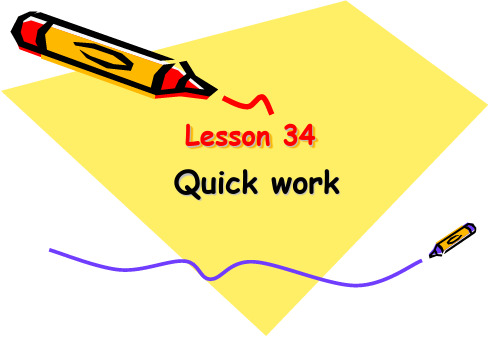
reccaelilveo:u强t (调to客) 观大接声收叫,而喊不含采取主动或积极行动
calDl a(snb.R的)obu意pin思so。n给h某as人b打ee电n 话wo(美rr语ied) all week.
calLl aosftf Tuesda取y 消he(某re项ce活iv动ed) a letter from the local
大声叫喊
⑤ call off
取消(某项活动)
⑥ call in
召集
I live in the house five miles away。
pick up a) 拎起,拾起,捡起
电话铃一响,我就拿起了话筒。
I picked up the receiver as soon as the phone rang. b) (用)车接(人或物);车辆(中途)搭(人)
我来办公室接你。
Lesson 34
Quick work
Words
nat•ivwe oanddje.本r 国v的. ,想本知地的道 n.本地人;土著人 • local adj. 地方性的,当地的,本地的 • station n. (警察)局
①见解a••d等mav).m非osu常ts,e 很a(d相v.v当.娱相于v乐当er;,y使非,但发常通常笑用,使于表愉达快主观感情、
bicycle was picked
tuhpeinpoalicsemmaall<n vNtiloolatldegeh4if>mo,urthe
hundred miles away.
3.pick up (偶然地、意外地)找到、获得、学会 <Note 5>
five miles away这一类结构可以直接 作定语,放 在被修饰词后面。
- 1、下载文档前请自行甄别文档内容的完整性,平台不提供额外的编辑、内容补充、找答案等附加服务。
- 2、"仅部分预览"的文档,不可在线预览部分如存在完整性等问题,可反馈申请退款(可完整预览的文档不适用该条件!)。
- 3、如文档侵犯您的权益,请联系客服反馈,我们会尽快为您处理(人工客服工作时间:9:00-18:30)。
very:客观的陈述 e.g.: He is very tall. 他非常高
Last Tuesday he received a letter from the
local police.
accept &receive? 他已经接受了我们的邀请。
-What does he/she do? -He/She is a …
doctor nurse
hospital
-Where does he/she work? -He/She works in …
-What does he do? -He is a/an …
restaurant waiter
-Where does he/she work? -He/She works in …
something. n.烦恼;焦虑;担心 ,令人发愁的事 e.g.: Mother's illness was always a great worry to me.
1、Last Tuesday he received a letter from the local police.
the local police 当地警察局 local ['ləʊkl] adj. 地方性的,当地的,本地的
1. 从意思上看:rob 指公开地“抢”、“夺”(通常 使用暴力);而 steal 则指在人们不防备或不在场的 情况下悄悄地“偷”。
2. 从结构上看,两句所使用的句型完全不同:
•rob+被抢的人或地方+of+被抢的东西
•steal+被偷走的东西+from+某人或某地
•They robbed the bank of a lot of money. 他们从银行 抢了很多钱。
hear us. • I called _a_t__ the post office on my
way to work. • “Help!” the injured called _ou_t__to the
rescue team.
3、Ted wondered why he was wanted by the police, but he went to the station yesterday and now he is not worried any more.
station.
1)call at表示“对(某个人家或地方)进行短暂
访问”: e.g.: He calls at every house in the
street once a month. 他每月对这条街上的每户人家光顾一次 e.g.: He was asked to call at the police
pick up 1) 拿起,拾起: e.g.: I picked up the phone as soon as the
phone rang. 2) 用车接人: e.g.: I’ll pick you up at your office. 3) (不经意) 学到: e.g.: He picked up French in Paris. 她是在巴黎学会法语的
2)adj.大多数的,大部分的: Most doctors don‘t smoke. 大多数医生不吸烟。 3)adv.非常,很(相当于very,但通常用 于表达主观感情、见解等): This is a most interesting/ exciting story. 这是个非常有趣/激动人心的故事。(说话 者的观点)
4)call up “打电话(给某人)” e.g.: Jane called me up the other day 前几天,简给我打过电话
5) call off 可以表示“取消(某项活动)” e.g.: For some reason, they have called
off the meeting. 由于某种原因,他们把晚会/会议取消了
------Call------
1. call at 2. call on to visit
He was asked to call at the police station. George is calling on me tonight. (Less formal) 3. call out: shout 4. call up: telephone People on the bank called out to the man, but he didn’t hear them. Mr. Green will call you up tomorrow morning. 5. call off: cancel It began to rain so we called off the match. The couple decided to call off their reservation.
station.
2)call on 表示“拜访”、“探望”: e.g.: Have you called on George recently?
你最近去看过乔治吗?
3)call out表示“大声叫喊” e.g.: Some people on the bank called
out to the man in the boat. 岸上的一些人对着小船上的那人高喊
wonder ['wʌndə(r)] v. (want to know)
1. + (that) 从句
e.g.: I wonder (that) when we can arrive in Beijing.
2. + to / at 感到惊讶
e.g.: I wondered to hear her voice in the next room.
4)(无意地,顺便地)获得,找到: e.g.: I've picked up a bad cold.
我得了重感冒
most
1)adj.用于最高级,表示“最……”: This is the most beautiful can/ garden I‘ve even seen. 这是我见过的最漂亮的车/花园。 The most intelligent girl in this class is Jane. 这个班上最聪明的姑娘是简。
-What does he/she do? -He/She is a …
actor
-What does he/she do? -He/She is a …
singer
-What does he/she do? -He/She is a …
writer
-What does he/she do? -He/She is a …
coach
-What does he/she do? -He/She is a …
pilot
-What does he/she do? -He/She is a …
manager
-What does he/she do? -He/She is a …
policeman (policemen)
Police Station
n [C]. 奇迹 The seven wonders of the world
not......any more = no more 不再, 再也不
4、Five days ago, the policeman told him, the bicycle was picked up in a small village.
station ['steɪʃn]
2) n.车站 a railway station 火车站 a bus station 汽车站
e.g.: She got off at Victoria Station. 她在维多利亚车站下了车
worry ['wʌri] ['wɜ:ri] adj.表示“焦虑的”、“担心的” e.g.: She’s worry. vt. 表示“使担心/发愁” e.g.: Nothing worries me vi.表示“忧虑,担心” e.g.: She appears to be worried about
-What does he/she do? -He/She is a/an …
restaurant
waitress
-Where does he/she work? -He/She works in …
-What does he/she do? -He/She is a …
shop assistant
•They stole a lot of money from the bank. 他们从银行 偷了很多钱。
local color 当地色彩, 地方色彩 a local newspaper 地方性报纸 local news 本地新闻 local shops 邻近的商店 native [‘neɪtɪv] n. 土著人;
adj. 土生土长的
2、In the letter he was asked to call at the
He has accepted our invitation. 我没有收到你的传真。 I didn’t receive your fax. accept: 强调主动地或自愿地接受,或者说,
经过考虑后同意接受。 receive: 着重仅仅接到或收到这一结论或事实,
而不含采取主动或积极行动的意思。
rob 与 steal 的用法区别
• I called _o_n__ you five times yesterday.
Were you out? • It’s too late go to dinner. Why don’t we call the whole thing _o_f_f? • We called _o_u_t_ to him but he could not
